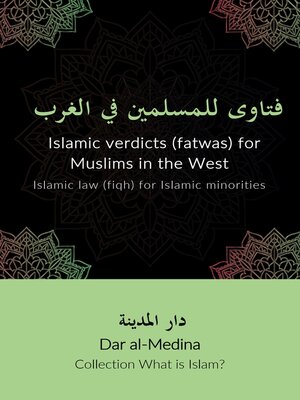Islamic verdicts (fatwas) for Muslims in the West
ebook ∣ Islamic law (fiqh) for Islamic minorities · Collection What is Islam?
By Dar al-Medina (English)

Sign up to save your library
With an OverDrive account, you can save your favorite libraries for at-a-glance information about availability. Find out more about OverDrive accounts.
Find this title in Libby, the library reading app by OverDrive.



Search for a digital library with this title
Title found at these libraries:
| Library Name | Distance |
|---|---|
| Loading... |
Can a Muslim acquire French or American nationality? Can he marry a Christian? Is he allowed to celebrate Christmas? How should Muslims in the West determine the beginning and end of the month of Ramadan? Is circumcision obligatory for new converts? These are all questions that every Muslim in the West must ask and which are answered by the greatest contemporary scholars.
This book is all the more important because Muslims often live in societies that lack muftis - worthy of the name - who can guide them with their fatwas. A fatwa is a decree, a religious opinion, which presents, with Islamic evidence, the judgment of Islam on a particular issue or a ruling on the conformity of an act with Islamic law.
The religious verdicts offered here are taken from the collection of fatwas of the Standing Committee for Religious Research (Ifta) of Saudi Arabia, chaired at the time by Shaykh Ibn Bāz, may Allah have mercy on him, the collection of fatwas of Shaykh Al-'Uthaymin, may Allah have mercy on him, and that of our beloved Shaykh, Sa'lih Al-Fawzān, may Allah preserve him.
The selected fatwas address the problems Muslims face in living their Islam in the West and in their relations with non-Muslims. An entire section is devoted to the imitation of non-Muslims, something Islam flatly rejects. In the West, as elsewhere, many Muslims have succumbed to the temptation to imitate the infidels in their morals, their physical appearance and, most seriously, in their religious festivals.
The last part is dedicated to the questions that new converts ask themselves, in their relationship with Islam, with Muslims, with their former co-religionists or with their families.







